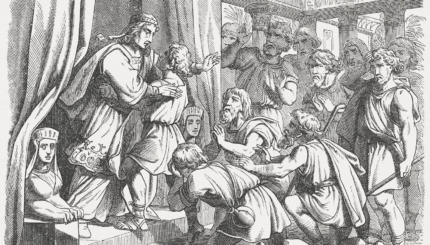At the close of 2017, we also close the Book of Genesis. As the saga of our Patriarchs resolves, Jacob lays dying, and he reaches toward a future he will not see, bestowing blessings and predictions upon his sons and grandsons.
In this process, he singles out his fourth son Judah as destined to produce the harbinger of the Messianic Era. Our rabbis have asked, why Judah, the son who suggested the brothers sell Joseph to a passing caravan? Why Judah, the one who supplied Joseph’s a bloody coat, as evidence of death, to his grief-stricken father? Why Judah, who lay with a [seeming] harlot at the crossroads? Surely he was a sinner. But the rabbis answer: Judah’s line will herald our ultimate fulfillment of a peaceable kingdom on earth because he, amongst all his brothers, was introspective, expressive of remorse, because Judah does – not once, but twice.
The “harlot” with whom Judah lay was, in fact, his own daughter-in-law Tamar, twice married to Judah’s sons, each of whom died an untimely death, leaving her childless. When Judah denies Tamar his third son, she acts in desperation, seducing Judah to secure her right to a child sired by the family. The incident occurs at a crossroads called Petah Enayim, the literal meaning of which, is – the place where eyes are opened, the place of discernment.
What did Judah come to understand at the crossroads of awareness? What did he see? He saw the pain of Tamar’s childlessness, and his aroused empathy, coupled with his own bereavement, triggered remorse for the terrible pain he had caused his father.
Tanchuma teaches that for his act of publicly justifying Tamar’s cause, Judah – Yehudah – spelled Yud, Hey, Vav, Dalet, Hey, is to be read as the name of God (Yud, Hey, Vav, Hey), with a Dalet – a delet – a door in the middle. This doorway to God inside himself is Judah’s access to his inner moral core. He lets God in, and becomes, himself, a doorway to the Messiah, its progenitor.
Judah’s second act of teshuvah comes late in Genesis. He extends himself to protect his youngest brother, Benjamin, begging Egyptian viceroy Joseph to hold him, instead of Benjamin, in custody for the alleged theft of a goblet. This section opens with Judah’s supplication: “Vaygash,” he approached, and pleaded, “Bi, Adoni” – “Please, Sir,” or “Me, Sir!”; take me. But the rabbis teach that is was not just Joseph that Judah approached, he also approached his god, saying, “Bi, Adoni” – “Within me is my Adon,” in other words, “God, is within me.” Again, he expresses awareness of the godliness inside him, his moral core, and he repents, saying, “I have a conscience, and I know what I did”: “It’s on [in] me.”
Joseph is moved by Judah’s vulnerability as he expresses culpability, falling on his neck in reunion. Joseph is moved by Judah’s teshuvah to repent his own anger and vengeance, shifting to forgiveness and reconciliation. So, too, is God moved by Judah’s authentic self-awareness, and he is blessed as ancestor to the one who will proclaim peace at the end of time.
Even as the secular New Year is not one we celebrate with a day of atonement, this message of the potency of introspection and readjustment comes to us, through Torah, in a timely manner. As we revel in the close of 2017, let’s utilize the powerful tool of our tradition that is teshuvah, committing to New Year’s resolutions from a place of awareness of the God within us, our moral core, the core we can come home to whether at Rosh Hashanah or on December 31st.



